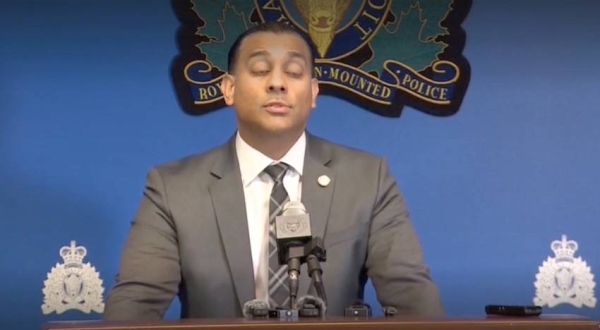The recent arrest of three Indian nationals in Canada in connection with the killing of Sikh separatist leader Hardeep Singh Nijjar has reignited a major diplomatic row between the two countries. Nijjar was shot dead last June by masked gunmen in a Vancouver suburb, sparking accusations from Canadian Prime Minister Justin Trudeau that the Indian government may have been involved. The arrests of Karan Brar, Kamal Preet Singh, and Karan Preet Singh in Edmonton, Alberta have been made in connection with the murder, and they have been charged with first-degree murder and conspiracy to commit murder.
Superintendent Mandeep Mooker announced the arrests on Friday, stating that the suspects had been living in Canada for three to five years. The investigation is ongoing, with police looking into potential connections to the government of India. Collaborations with Indian counterparts have been challenging in the past, but investigators are working to uncover more details about the case. There may be more individuals involved in the killing, and further arrests or charges are possible.
Hardeep Singh Nijjar was a known Sikh separatist leader who campaigned for the creation of an independent Sikh homeland in the Punjab region of India. The movement for Khalistan, as it is known, has largely been limited to countries with large Sikh populations since the 1980s when a separatist insurgency in India resulted in thousands of deaths. India has described Nijjar as a terrorist and leader of a militant separatist group, but his supporters deny these accusations, stating that he had received threats in the past due to his activism.
Nijjar was killed at the Guru Nanak Sikh Gurdwara in Surrey, near Vancouver, on 18 June last year. Prior to his death, Nijjar had reportedly been warned by Canadian intelligence services that he was on a “hit list” and faced threats to his life. Following the arrest of the three Indian nationals, members of the Sikh community in Canada have expressed relief at the progress in the investigation, but concerns remain about public safety and potential tensions within the community.
Three months after Nijjar’s killing, Trudeau made public statements in the House of Commons alleging potential links between the Indian state and the assassination. Indian officials denied these allegations and accused Canada of harboring “Khalistani terrorists and extremists.” The diplomatic fallout between the two countries led to India requesting Ottawa to reduce its number of envoys in India. Trudeau has been under pressure to provide evidence to support his claims of Indian involvement in Nijjar’s killing.
The case of Hardeep Singh Nijjar’s assassination highlights the complex dynamics between Canada and India, as well as the ongoing struggles within the Sikh community over the issue of Khalistan. The arrests of the three Indian nationals in connection with the murder are a significant development in the investigation, but the full extent of their involvement and any potential connections to the Indian government are still being determined. The outcome of this case could have far-reaching implications for diplomatic relations between the two countries and the broader Sikh separatist movement.










